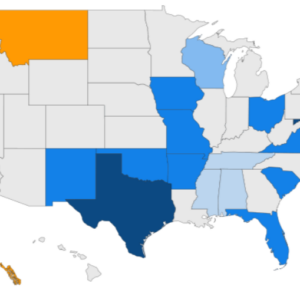
The Fair Credit Reporting Act (FCRA for short) is a crucial piece of legislation when it comes to your credit rights, because it protects your rights to both credit report accuracy and privacy. In other words, it helps ensure that the information contained in your publicly available credit profile represents your creditworthiness accurately. It also helps prevent just anyone from requesting and accessing your credit report, since only certain people are legally permitted to view an individual’s personal credit information.
The information below is designed to help you understand what the FCRA really says in simple terms, and how this protects your rights as a consumer. If you have questions about your credit or how your credit report may be used during the credit counseling call Consolidated Credit today at (844) 276-1544 to speak with a certified credit counselor.
The FCRA was originally passed in 1970, but it’s updated regularly because it’s such an important piece of legislation when it comes to consumer credit rights. The most recent revision came in 2011, although several new proposals and bills to revise the FCRA have been issued in Congress since then – one major overhaul in 2014 and then again in 2015, this time focusing on credit checks by employers.
As you can see, the FCRA is still a big deal even almost 50 years since it was first written. It’s also constantly evolving – or Congress is at least regularly looking into ways to improve it to better protect consumers from unfair reporting practices. Basically, the FCRA is the federal government’s way of regulating what private credit bureaus like Experian, Equifax, and TransUnion can put in your credit report and who they can and can’t give it out to when it’s requested. It also ensures the accuracy of the information contained in your report.

by Meghan Alard
September 7, 2024

by Meghan Alard

by Monica Victor

by Tyler Fordham
The first and biggest role the Fair Credit Reporting Act plays in your life is who credit reporting agencies (i.e. the credit bureaus mentioned above) can give your report to when it’s requested. These organizations essentially hold one of the major keys to your financial life in their hands, and that report contains highly sensitive financial information. So you don’t just want anyone to be able to get their hands on your report.
So in a day where people can search online for your physical address, your contact information, and even your criminal record, one thing that should never be available publicly is your credit report. Unless the FCRA goes away completely, someone should never be able to go online and find a directory of consumer credit reports online – and that’s a good thing!
There are only a certain number of reasons a business, organization or agency can request your report to review all or part of your profile:
There are some limits to when a credit report can be provided, too, and the credit bureaus are often responsible for ensuring minimum standards are met:
The second key piece of the Fair Credit Reporting Act limits what can be reported about you when it comes to information that could negatively influence your creditworthiness. In general, the FCRA limits the amount of time negative information can be reported to 7 years – usually from the date the negative information was incurred, noted, etc. In a few cases, negative information can remain longer if it relates to a specific financial concern, such as bankruptcy.
As stated in the first section, medical information must be coded correctly so that sensitive health information isn’t recognizable within it. Finally, only up to the last 5 digits of an account number can be included.
Any agency who maintains a credit report on you as a consumer is required to follow “reasonable procedures” to ensure the maximum level of accuracy possible when information is provided on you. They also have to provide a means for you to correct information that you believe is inaccurate.
This is what the Fair Credit Reporting Act says about how a consumer can dispute something that’s in question:
If disputed information can’t be verified, it has to be removed from your credit report. The provider has to be notified and the info can’t be reinserted without informing the consumer. If a dispute is rejected, the consumer has a right to submit a 100-word statement explaining the dispute. This ability to dispute is further defined and regulated by the Credit Repair Organizations Act.
Of course, you’re only able to dispute information that could be inaccurate in your credit report if you know it’s there. Luckily, the Fair Credit Reporting Act gives you ways to find out about negative information, too.
Here’s how you can find out about negative information:
The last important protection offered by the Fair Credit Reporting Act deals how your credit reports can be used for the purpose of identity theft prevention if your personal information or data is compromised by account theft or fraud. There are also fraud protections for active duty military service members.
All alerts prohibit the establishment of new credit plans or loans, as well as the issuance of new cards on existing accounts. It also prohibits credit limit increases that are not specifically authorized by the consumer.